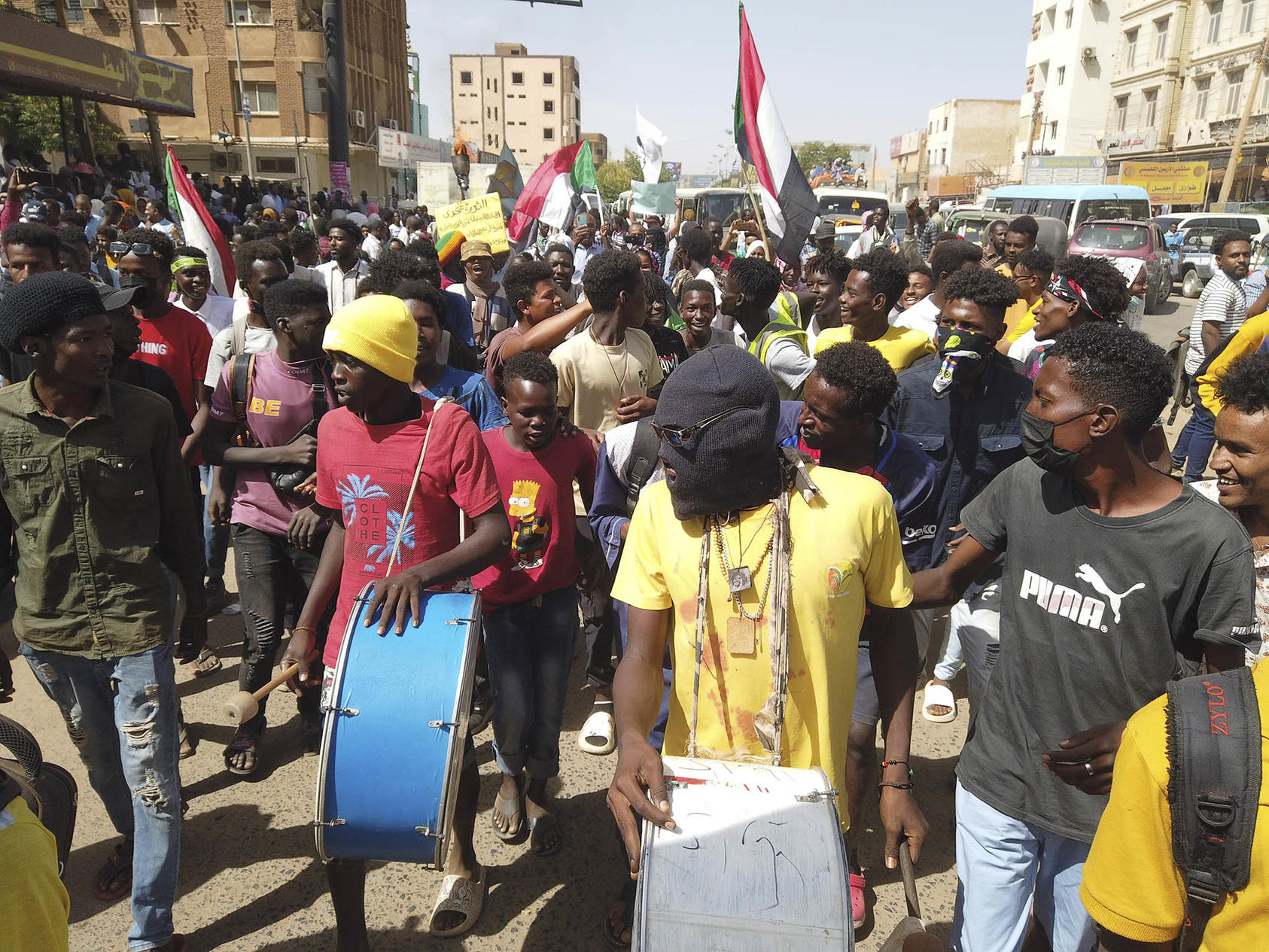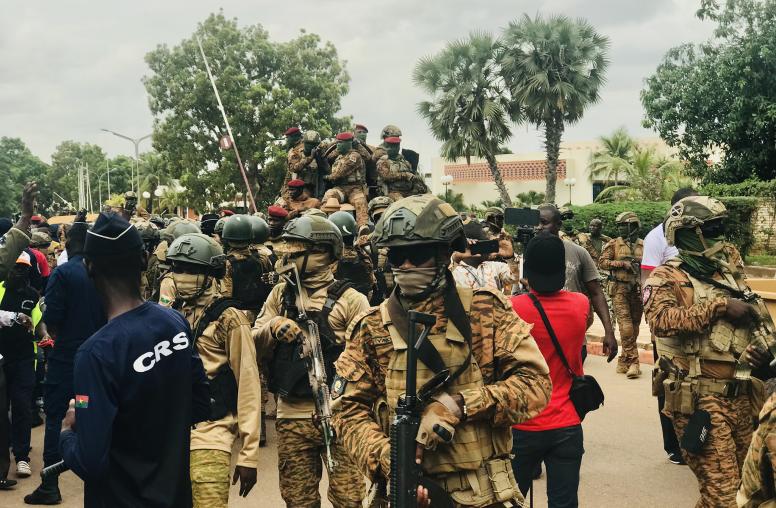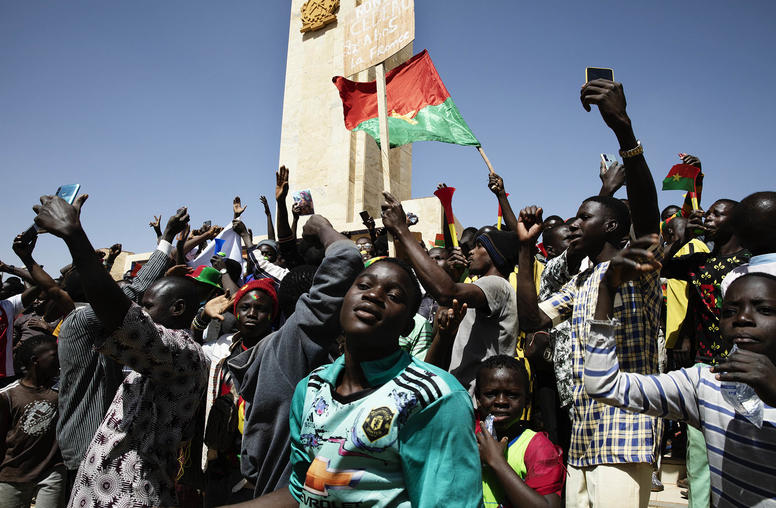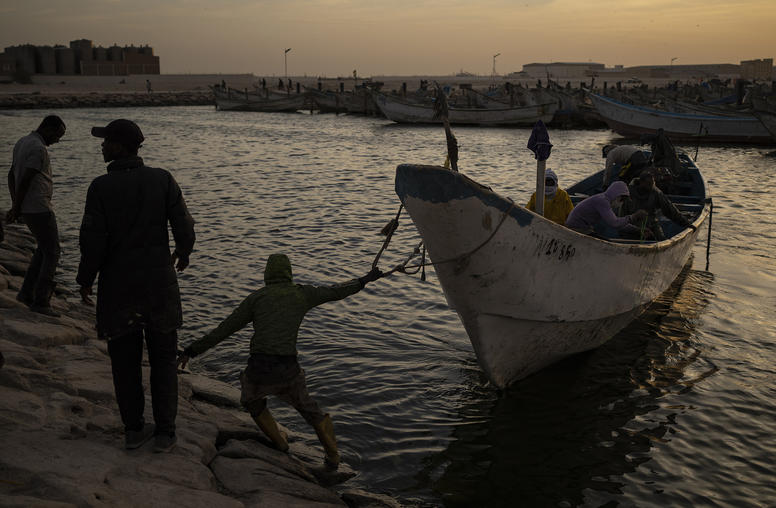Countering Coups: How to Reverse Military Rule Across the Sahel
Patterns in the Sahel’s coups provide guidelines to building effective democracies.
Three years of coups around Africa’s Sahel region — eight of them in six nations, from Guinea on the Atlantic to Sudan on the Red Sea — leave many African and other policymakers frustrated over how to respond. The Sahel’s crises have uprooted more than 4 million people and could add millions more to our record levels of global human migration as Africa’s population grows and its climate destabilizes. Yet the pattern of coups and other evidence — notably from USIP’s Sahel fieldwork, counter-coup research and bipartisan analysis teams — offer guidelines for effective responses by African, U.S. and international policymakers.

Sahel Coups: What the Patterns Show
Patterns among the Sahel’s coups show their root causes and how policies should respond. (USIP is refining recommendations for those responses through its Bipartisan Senior Study Group for the Sahel and its Countering Coups project.) Countries vulnerable to military regimes face three main realities:
First, systems of governance were not effectively democratic.
Africa’s centuries under colonial control led to the past 60 years of independent but often artificial states, built for top-down rule as profit machines for European rulers, not as expressions of their citizens’ will. Ghana, Botswana, Mauritius and other countries overhauled their colonial governance structures into democracies that respond effectively to citizens’ needs. But states stricken by coups are among the many across Africa where real power remains concentrated in particular communities or narrow elites.
African states achieved significant democratization following the Cold War. The Ibrahim Index of African Governance showed governments improving their responsiveness to public needs through the 2010s. This ability for democracy to deliver basic services from security to food is arguably as important an indicator as holding free, fair and transparent elections. But even the most established democracies struggle to maintain stability in the face of spreading grievances, and African democracies have had fewer resources against a tsunami of crises: deepening poverty relative to the global economy, unsolved communal conflicts, the COVID pandemic and climatic degradation of water supplies and arable land.
Second, large youth populations’ aspirations for economic opportunity and political voice remain unmet.
Africa is the world’s epicenter of population growth. Nearly half of Malians are younger than 14, with the country’s population set to double by 2035. Young Africans are globally connected and aspire to a better jobs, greater security and more responsive governments. The countries grappling with violent extremism and its close cousin, military coups, are those where educational systems, economies and power structures have constricted opportunities and failed to meet the hopes of youth for building their futures. Some young people across the Sahel are leading the most courageous initiatives to counter hate speech, reintegrate former combatants back into communities, and provide relief to those suffering the most in the war in Sudan. And, some Sahelian youth have been vulnerable to recruitment to violence — whether communal or extremist insurgencies or military seizures of power — as an answer to their plight. Most of the Sahel’s coup leaders have been younger officers, in their 30s and 40s, supported by even younger men, both military and civilian.
Third, ineffective systems of governance lack the public credibility and capacity to prevent violent conflicts.
Governments have been unable to mediate conflicts — and security forces have too often responded to violence with blunt force against civilians that has multiplied popular anger and more violence. A decade ago, both Africans and their international partners hoped that a multilateral effort, including France, the United Nations and United States, could halt insurgent and extremist violence. While billions of dollars of spending has improved the military proficiency of armies and security forces, it has not improved their governance, a shortcoming that has weakened states’ legitimacy and popular support.
How Africans and Partners Must Respond
To prevent coups — and to shift countries from unstable, military rule to actual democracies — several imperatives for policy are clear. They begin with communicating to American, European and other citizenries the critical stakes, for ourselves and our children, of working with Africans to stabilize their countries. Demography, natural resources and economics ensure that Africa will be this century’s rising global superpower. Africa’s young, ballooning population will by 2050 form a quarter of humanity, far more than China or India. Africans will be able to provide globally critical new resources and economic growth — or, if enmired in warfare and unmanaged climate degradation, could be exporting extremisms, violence and millions more displaced people. No government in 2023 that hopes for global stability in this century can ignore the imperative of partnering with Africa.
As an epicenter of governance failures, extremism and violence, the Sahel region now should be made an exemplar for (1) an African-led, international campaign to resume the broad if uneven progress in democratic governance that Africans made from the 1990s through about 2010; and (2) cooperation in applying improved responses to violence, extremism and failed governance. Fortunately, as is visible in USIP’s Countering Coups project, research and field experience already illuminate the overall lines of better policies to promote stability.
Even better news for U.S. policymakers is that Congress and the U.S. administration already have begun making needed changes in America’s role. The bipartisan 2019 Global Fragility Act is an essential start to building America’s first unified, long-term strategy for supporting Africans’ repeated demands and courageous struggles to build stable, accountable democracies. America is launching that strategy in nine countries, seven of which are in Africa.
Another advance is the U.S. partnership with Africa promised by last December’s U.S.-Africa Leaders Summit — an initiative that must move from intent to concrete policy actions, notes USIP advisor Ambassador Makila James. One vital change is to broaden what has been an overly military-focused approach to Sahel stability. A strategically critical move for U.S. and African interests is to prevent a widening of the Sahel violence to the vastly more populous West African coastal region — a task for which USIP’s Coastal West Africa Senior Study Group and staff experts have urged concrete steps.
International support for Africa’s stability requires several changes in approach from the too-often failed policies of past decades:
- Require and support leadership from within Africa, through the African Union, regional intergovernmental bodies, national governments and civil society. This must include political and economic support for the African Union’s development plan for the continent, Agenda 2063.
- Help ensure the inclusion and accountability that Africans demand. Following coups, this will include more carefully designed transitions toward effective democracies instead of often rushing to simply schedule quick post-coup elections that will bake into the next government the same flaws that undermined the previous one, argues USIP’s Joseph Sany. Broad “national dialogues” can strengthen those transitions. Opinion data from 34 African countries identifies corruption as a dominant public grievance, according to Joseph Asunka of Afrobarometer, the leading African opinion research organization — and international partners must help African citizenries force better accountability into their governments, particularly in post-coup transitions.
- Africa’s partners must “flip the script” from their old patterns of development assistance to leverage the power of investment. This will not only fuel expanded economic opportunities vital to stabilizing violence-stricken African states, but also develop local private business sectors as natural, civil society engines for demanding better rule of law, including anti-corruption measures.
- International policies have “overly focused on short-term counterterrorism gains” sought through building more combat-proficient security forces, Joseph Sany and USIP’s Ena Dion have noted. But escalated state violence, often against innocent civilians or dissidents has only widened radicalization and people’s sense of their governments or states as illegitimate. Only a deep reform of security systems and a focus on securing people and communities rather than governments’ power, will permit a rebuilding, over years and perhaps generations, of public trust in their governments.
The Sahel Coups: A Brief Guide
U.S., African and international policymakers must navigate the crises in six different countries to reverse the trajectory of coups across what is now the world’s largest multinational region of military rule:
Burkina Faso’s two coups in 2022 began when a 41-year-old lieutenant colonel led the attack on an elected president, blaming him for jihadist insurgencies. That junta quickly lost more ground to the rebels and was ousted in a second coup led by a 34-year-old army captain. Burkina Faso has suffered decades of corrupt, repressive army rule, yet also has had one of the Sahel’s most energetic grass-roots, pro-democracy movements. USIP’s work on the ground, including local problem-solving dialogues and field research, indicate that, with reform of security forces, Burkinabe civil society can fuel, and a “national dialogue” can shape, a functional democracy.
Chad’s top military officers seized control in 2021 to preserve power upon the death of President Idriss Déby, a 30-year autocrat who had allied with international counterterrorism efforts. The officers were led by Déby’s son, Lieutenant General Mahamat Déby, who at 37 was the same age his father was upon seizing power in 1990. The ruling military council permitted a “national dialogue” conference in 2022 meant to guide a transition to democracy. Yet Chadian civil society activists then, and a Chadian political analyst Gondeu Ladiba last month, note that the ruling officers are repressing opposition and giving every sign of trying to sustain their rule indefinitely. Chad continues to face insurgencies in the far north and south.
Guinea suffered the latest of three coups in 2021, led by a 41-year-old U.S.- and French-trained officer. The coup “was simply an extension of a democratic erosion,” fueled by massive government corruption, “under the 11-year rule of the man they overthrew, President Alpha Condé,” according to USIP’s Joseph Sany. Guinea reflects the urgent problem for African stability and U.S. interests of preventing the Sahel’s violence from spreading to coastal states; recommendations include support for Guinea’s strong base of civil society.
Mali has suffered five coups since independence in 1960, two of them nine months apart in 2020 and 2021. Since 2012, Mali faced widening insurgency by ethnic Tuareg, jihadist and criminal groups. After years of international support that focused heavily on strengthening the kinetic capacities of Mali’s military, troops led by a 40-year-old colonel (who had received training from U.S., French and German forces) ousted the elected president in 2020. France soon withdrew its forces from Mali; the junta toppled its own appointed civilian president and turned to Russia’s Wagner Group for support that has inflicted massive human rights atrocities. In a USIP post-coup conference in Mali on how to fix its crises, civic activist Korotoumou Thera was one of many who have underscored the imperative of strengthening youth and women peacebuilders regionwide.
Niger also suffered five coups since independence in 1960, but had a decade of stable progress toward a working democracy before soldiers seized power last month. Niger’s relative stability made it a strategic focus for the African, U.S. and French efforts to counter the Sahel’s spread of extremist insurgencies. That amplifies the coup’s strategic setbacks for those efforts and, as Sany noted in recent congressional testimony, the concomitant widening of opportunity for Russia’s Wagner Group mercenaries or others to exploit the region’s violence.
Sudan suffered six coups and 53 years of military rule following independence in 1955. But elements for democratization include one of the world’s most prominent, resilient, youthful and nonviolent grassroots democracy movements. Mass protests in 2019 pushed army officers to topple the autocracy of General Omar al-Bashir and join civilian activists in a transition toward elected democracy, only to then overthrow that transition two years later. Those coup leaders ignited a factional war and humanitarian catastrophe, a crisis that USIP analysts underscore reflects our need for international partners to strengthen their support for civilians and apply multi-layered diplomacy in post-coup transitions.



